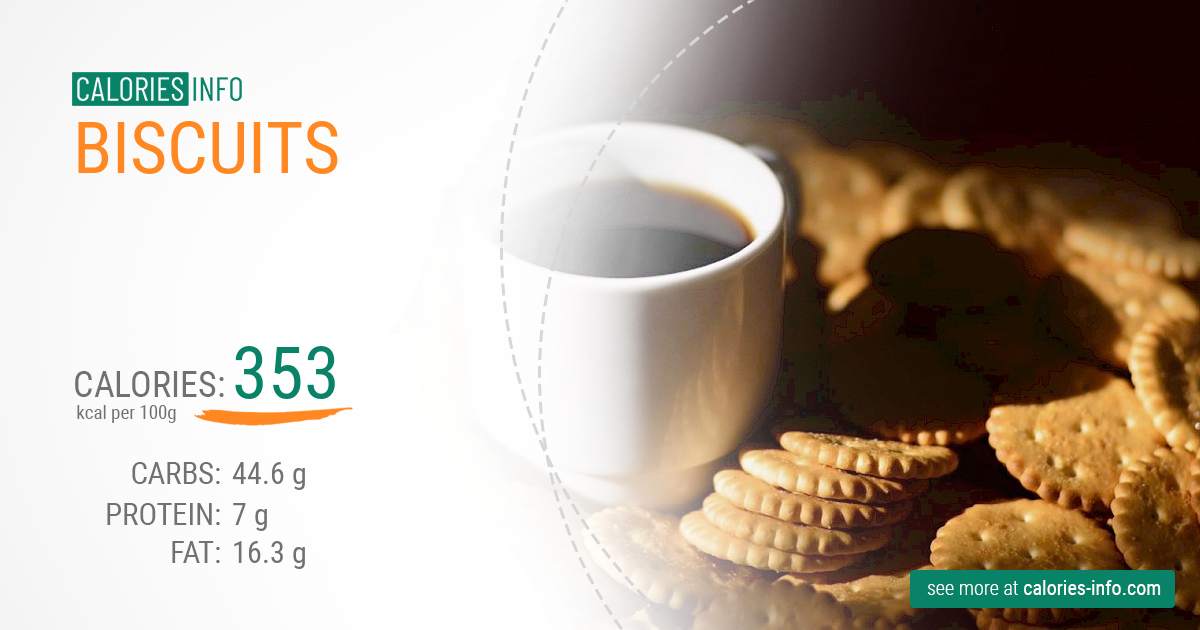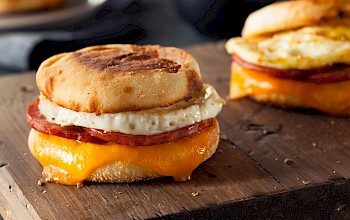Biscuits: Calories and Nutrition Analyse
How many calories in biscuit?

Nutrition Facts
BiscuitServing size:
medium size biscuit (17 g) change
5g10g15g20g30g40g50g60g80g100g120g140g160g180g200g220g250g300g350g400g450g500g600g700g800g900g1000g
1oz2oz3oz4oz5oz6oz7oz8oz10oz12oz15oz20oz25oz30oz35oz40oz50oz
Amount Per Serving:
100g of biscuits contain about 353 calories (kcal).
Calories per:
ounce
| one biscuit
| cup
| half cup
To illustrate, a medium size biscuit (17 g) contain about 60 calories.
This is about 3% of the daily caloric intake for an average adult with medium weight and activity level (assuming a 2000 kcal daily intake).
Scroll down for details and nutrition tables.
To visualize how much 60 kcal actually is, keep in mind that the calorie content of biscuit is similar to that of, for example:
- 1 apple
- 0.5 glass of Coca Cola (220 ml glass)
- 0.5 slice of cheese
- 0.5 slice of bread
- 3 cubes of sugar
Take a quick look at the tables below for detailed information about biscuit nutrition.
100g of Biscuit
Nutrition
- Calories353
- Carbs Total44.6 g
- Dietary fiber1.5 g
- Fat16.3 g
- Saturated fat1.41 g
- Protein7 g
- Water28.9 g
Vitamins
- Vit A82 IU
- Vit B1 (Thiamine)0.356 mg
- Vit B2 (riboflavin)0.31 mg
- Vit B3 (Niacin)2.949 mg
- Vit B60.035 mg
- Vit B9 (Folic acid)0.095 mcg
- Vit C0.2 mg
- Vit E1.1 mg
Minerals
- Potassium121 mg
- Phosphorus0.08 mg
- Magnessium18 mg
- Calcium235 mg
- Sodium580 mg
- Iron2.9 mg
- Zink0.08 mg
- Beta karoten1 mg
Unveiling the Nutritional Secrets of Biscuits
When it comes to comfort food, biscuits are often a top choice for many. Whether enjoyed as a quick breakfast option, a snack, or as part of a meal, biscuits hold a special place in the hearts of food lovers worldwide. But beyond their delicious taste and satisfying texture, have you ever wondered about the nutritional value of biscuits? Let's dive into the fascinating world of biscuits, exploring their calories, nutrition, and how they fit into a healthy diet.
Calories and Nutritional Breakdown
On average, a serving of biscuits contains approximately 353 calories. This calorie count is a crucial figure for those monitoring their daily intake for weight management or health reasons. But calories tell only part of the story. The nutritional makeup of biscuits includes 44.6 grams of carbohydrates, 1.5 grams of fiber, 16.3 grams of fat (with 1.41 grams being saturated fat), and 7 grams of protein. This composition makes biscuits a source of energy, primarily through carbs and fats, with a moderate amount of protein.
Understanding the Role of Macronutrients
- Carbs in Biscuits: The carbohydrates in biscuits, totaling 44.6 grams, provide the body with its primary energy source. However, with only 1.5 grams of fiber, most biscuits offer little in terms of dietary fiber, which is essential for digestive health.
- Fat in Biscuits: The 16.3 grams of fat contribute to the biscuits' texture and flavor. While fat is necessary for a balanced diet, it's important to consume it within recommended limits to maintain heart health.
- Protein in Biscuits: With 7 grams of protein, biscuits can contribute to your daily protein intake, essential for muscle repair and growth. However, biscuits should not be relied upon as a primary protein source.
Minerals and Vitamins in Biscuits
Biscuits also contain a range of minerals and vitamins, including calcium (235 mg), iron (2.9 mg), and magnesium (18 mg). These nutrients play vital roles in bone health, oxygen transport, and enzyme function, respectively. Additionally, biscuits provide small amounts of vitamins such as vitamin A (82 IU), vitamin B1 (0.356 mg), and vitamin B3 (2.949 mg), contributing to overall health and well-being.
Biscuits in a Healthy Diet
While biscuits can be part of a balanced diet, moderation is key. Due to their high calorie and fat content, biscuits should be consumed in moderation, especially for those watching their weight or managing health conditions. Opting for biscuits made with whole grains can increase fiber intake, and choosing varieties low in sugar and saturated fat can help maintain a healthier diet.
Conclusion
Biscuits, with their delightful taste and comforting texture, can indeed be part of a healthy diet when consumed wisely. Understanding the biscuits calories, nutrition, protein, fat, and carbs helps in making informed choices that align with your dietary needs and health goals. So, the next time you reach for that biscuit, remember its nutritional profile and enjoy it as part of a balanced and mindful eating plan.
How many calories are there in 1, 2, 3, or 5 servings of biscuits?
- Medium size biscuit (17 g)60 kcal
- Cup of biscuit (120g)424 kcal
- Half cup of biscuit (60g)212 kcal
- Ounce (oz) of biscuits100 kcal
- Half of medium size servings of biscuit30 kcal
- Small size serving of biscuit (14g)48 kcal
- Big size biscuit (22g)78 kcal
- Two medium size servings of biscuits120 kcal
- Three medium size servings of biscuits180 kcal
- Four medium size servings of biscuits240 kcal
- Five medium size servings of biscuits300 kcal
Compare biscuit:
biscuit vs croissant, biscuit vs muffin, biscuit vs cake, biscuit vs sugar, see all compares of biscuit.

Similar calories number have:
See also:
Read this:
- How many calories does herring have?
- Calories in tablespoon of ground cinnamon
- Calories in teaspoon of ground cinnamon
- How many carbs (carbohydrates) in saag paneer?
- How much fat in Gushers?
- How much protein in blood orange?
- What is weight of egg foo yung?
- Rolo calories per ounce (oz)
- Idli calories per serving size



Add comment